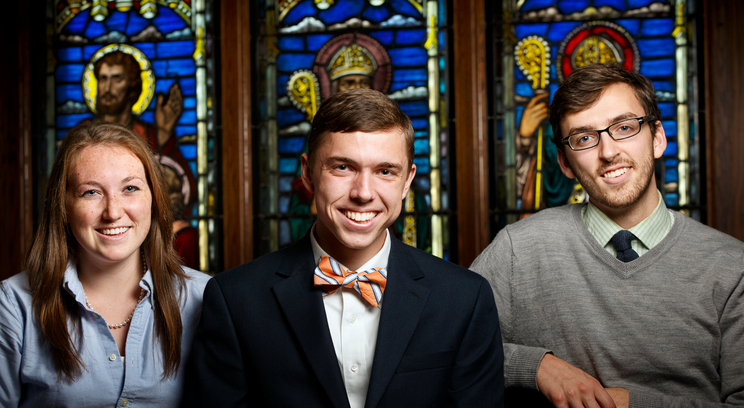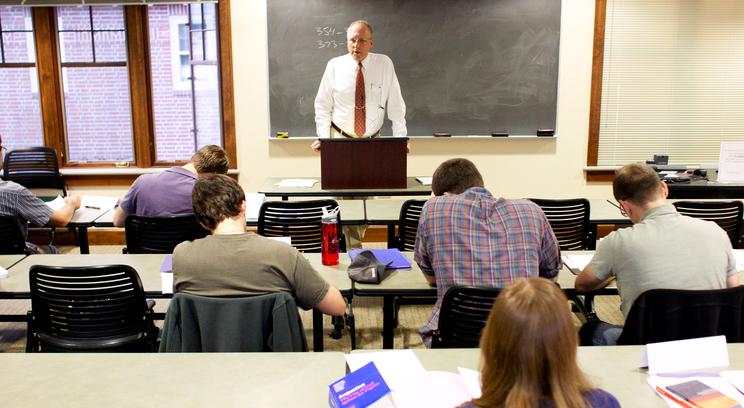What makes an undergraduate degree in Catholic Studies worth pursuing? Why do nearly 80 students graduate with majors or minors in Catholic Studies? Who are these students and why are they choosing a difficult course of study, in addition to their complementary professional studies? What is the advantage of a dual course of study? We asked six current undergraduate students to reflect on their academic courses and to answer the question: “Why is a Catholic Studies degree ‘More Than a Minor Advantage?’” Their essays can be found on the Habiger Institute for Catholic Leadership website.
Evan Beacom
During my three years in Catholic Studies I have been to nine countries on three continents and taken eight courses taught by brilliant professors. I’ve also gained real-world experience in a part-time job, an internship and numerous service opportunities. In the context of Catholic Studies I am able to shape my ideas on themes as diverse as race, leadership, gender theories, work, the integration of knowledge and the modern era. Most essentially, I’ve been given the opportunity, as Dr. John Boyle put it in my first CS course, “to study the effects of the incarnation on human thought and culture.” And I still have a year of this adventure to go.
Despite the academic richness of CS, I regularly am asked what practical value Catholic Studies will offer my career. Though I did not choose this major with career goals in mind (my other major is biology), I am, happily, not left without an answer for such interlocutors.
Catholic Studies has prepared me for application and entrance into medical school: I attended the Catholic Medical Association national conference last year, and I volunteered in impoverished medical clinics in Lima, Peru, last summer. I emerged from both experiences with a discipline of mind that benefits me as I continue with my science research and course work.
Should I become a doctor, my hope is that Catholic Studies will continue to form and inform me in my future practice. As a future physician, the way I approach a field of work with a growing number of ethical considerations, the way I approach the human person in my patients, and the way I endeavor to serve − to give and not count the cost − will be shaped by my years with Catholic Studies. These years will be not only an influence but also the basis of whatever career in which I find myself.
I have a year left in my adventure with Catholic Studies, but at this point I’m beginning to wonder. Maybe this will prove to be the sort of adventure that’s more of a beginning than an end.
William Manaker
While I cannot credit Catholic Studies with first cultivating in me the basic human desire to seek truth − that was the work of my parents − I can credit it with giving me direction and clarity in that desire.
I always have had a deep love for learning. From a young age I was always reading something and in school I pursued my studies earnestly. Though learning something new brought delight and satisfaction, I felt something was lacking in my understanding of study.
In my Catholic grade school and public high school I had no idea where my love for learning came from. Had I been presented with an account of learning as a search for truth stemming from a desire to encounter the one who is the source of all truth, I may have agreed, but I doubt I would have understood what this meant.
In grade school the seeds of such an understanding were planted in my mind, but they remained only seeds until I began taking courses in Catholic Studies at St. Thomas, where, through my classes, I came to understand learning as an encounter with truth.
My high school − a specialty school for science and technology − was incredibly different from what I encountered in my Catholic Studies’ classes. The empirical sciences were the queen of all disciplines. Faith had little or no place in the classroom; it was a matter of private personal preference; furthermore, skepticism and relativism were ubiquitous. I knew because of my upbringing in the faith that these attitudes toward truth were problematic, but I nonetheless was affected by them.
In my Catholic Studies classes, however, study was presented as a search for truth rather than a means to worldly ends. Faith and reason were presented as being more than merely compatible with one another. Faith was shown to be (especially through John Henry Newman) an integral part of rationality and that it provided the starting point from which it was possible to make use of logical reasoning in a fruitful manner.
Elizabeth Murphy
The first question that every college student is asked is, “What are you studying?” I have not been exempted. My answer takes most people by surprise. Sharing that I am a double major in business marketing management and Catholic Studies makes them wonder what a Catholic Studies major is and why I would choose to double major in it. I had not planned on double majoring when I started at St. Thomas, but after my first Catholic Studies class I knew this course of study was foundational to finding out who I really am.
My time in Catholic Studies has impacted me in ways that I may not even fully recognize until after I graduate; however, I do recognize the impacts it is already making in my life. I couldn’t be more pleased with the results. My major in Catholic Studies has taught me more outside of the classroom than I ever anticipated. The challenge of integrating faith and reason and seeing how it impacts those around us and in my business courses has been significant. The beauty of my degree is that it is teaching me how to live. I am learning how to “be transformed by the renewal of [my] mind, to discern what is the will of God.”
Not every college student has the opportunity to live his or her major in a real way, and I know I have had that opportunity, thanks to the foundation for study that Catholic Studies has built. My professors and co-workers in business have shown me how to live life to its fullest while seeing how Catholic Studies shapes my business major. The courses have taught me how to see the world in ways I have not learned anywhere else.
Catholic Studies has opened many doors for me professionally. It also has given me a new sense of joy and hope I see lacking in this world. I have found peace in my decision to move forward as a business professional, and I cannot express my excitement to live and work in a business environment. Through Catholic Studies, I know that I do not have to change things; rather, I can observe the way things are done in a new way. My time in Rome broadened my view of not only our universal faith but the way it impacts daily life, no matter the setting.
Read more from Perspectives magazine.







